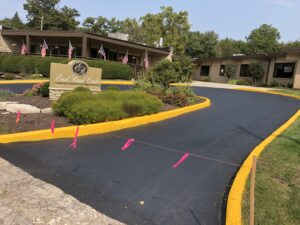
Between heavy rains, snow storms, hot weather and the daily wear and tear of traffic, the asphalt in your driveway or parking lot can take a beating. Adding a sealcoat to your asphalt can protect your driveway and your investment. Sealcoating is when a thin liquid layer is added over a paved surface to protect it from damage caused by UV rays, rain and snow, and fluids from vehicles. Sealcoating won’t cure existing issues, like cracks, but it will help prevent such damage from forming in the first place
Should I consider sealcoating?
Great question!
But first, to answer that question, we need to first discuss how asphalt works.
Asphalt is used for paving and road construction because it is waterproof and flexible, and has adhesive properties that bind and hold the aggregates in the pavement. Asphalt improved on the old method of building roads, which involved spreading graded stone aggregate, a system that required regular repairs, and only worked when the materials stayed dry and in place. With asphalt, the aggregates used in road construction are prevented from absorbing water, making them stronger and improving their load-bearing ability. This is extremely important due to the semi-trucks and other large vehicles that are driven over roads daily. Modern asphalt is a mix of stone aggregate and asphalt cement. The pavement you see is essentially the roof of the road, and covers a bed of stone, which carries the load of traffic. It needs to be elastic so it can expand and contract but remain intact. This expanding and contracting over time however leads to cracks and potholes.
Why would asphalt need to be sealed?
Another great question!
Despite asphalt’s superior waterproofing and adhesive capabilities, it still has some downsides when it comes to its chemical make-up, which makes it easy for water, salt and other chemicals to degrade its molecular structure. Salt, especially in states where there is snow, will degrade roads quicker than usual. As the asphalt molecules break down, the pavement loses its binding and waterproofing properties. You can see this phenomenon in action when roadways turn from black to grey.
Therefore, when oil or gas leak onto asphalt, they dissolve the similar chemicals found in the asphalt. This isn’t as much of an issue on roadways, where continuous traffic essentially kneads the oxidized surface layers back into the pavement. But on surfaces such as parking lots and driveways, with less traffic, asphalt degradation becomes more of an issue.
Last question: What will sealcoating do?
This has multiple answers:
- When used as part of a preventative maintenance program, seal coating when first applied 12-18 months after asphalt installation and then every 2-3 years thereafter, if applied as per the manufacturers specifications (Proper water dilution, addition of a latex modifier & addition of silica sand for traction and durability) will extend the life of an asphalt parking lot by 20 years on average if completed in conjunction with a Preventative Maintenance Plan to include hot rubberized crack sealing and inspection of the parking lot on an annual basis to cure issues right away.
- Seal Coating will help melt ice and snow faster as the deep rich black color retain heat from the sun.
- Seal Coating will make sweeping and cleaning the asphalt parking lot easier as it creates a smooth surface.
If your parking lot has degraded to such a point that cracks and potholes litter every step, sealcoating WILL NOT solve this problem. An entire overhaul will need to be done before any sealcoating is performed. Remember: YOUR parking lot is YOUR customers’ first impression!
